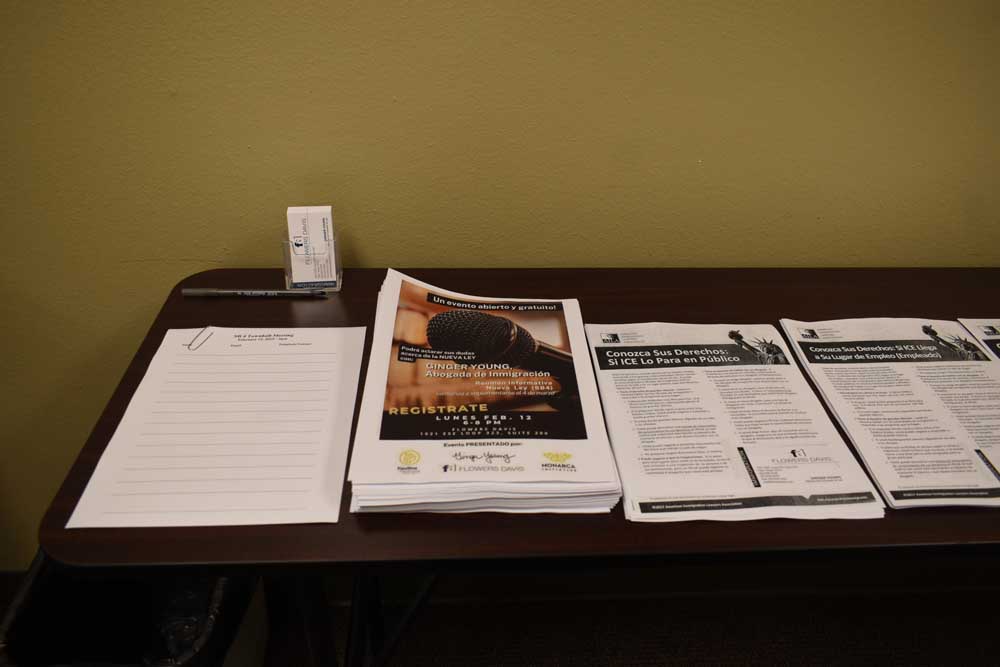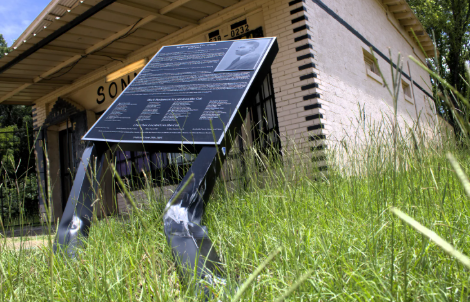Tyler nonprofit, immigration lawyer host town hall on SB 4 to help inform community
Published 5:30 am Saturday, March 2, 2024

- Explainers were available for attendees about SB4 during the SB4 town hall on Feb. 12.
After a federal judge ordered a preliminary injunction, Senate Bill 4 was halted this week. Local experts hope this gives them more time to inform people of their rights and some hope it will be stopped permanently.
In February, local immigrant-focused organization hosted two meetings to help inform the public about SB 4.
Trending
People slowly began to come in at Flowers Davis, P.L.L.C on Feb. 12 around 6 p.m., when the SB 4 town hall was scheduled to start. Leading the event was East Texas immigration lawyer Ginger Young, who alternated between Spanish and English, answered questions and explained the components of the law and what to do if stopped by a police officer.
In preparedness for this town hall, Monarca Initiative organized a Facebook Live in early February with Sheriff Larry Smith where Smith reiterated nothing will change in Smith County and deputies will not ask people for papers.
Smith said in a previous interview with the Tyler Morning Telegraph the law could be difficult to enforce in East Texas, as proving that someone found here had crossed the border illegally would be “almost impossible.” Officers shouldn’t get into the habit of asking people based on their nationality if they crossed the border illegally, he said. That practice is called racial profiling.
“I don’t see that enforced hardly any, if at all, this far inside the border,” he said at the time.
The town hall came together after Monarca Initiative and Young collaborated and decided they needed to do something to inform the public about the law. The Monarca Initiative, which helps immigrants, had been receiving questions from people about the law, and there was a lot of uncertainty, said Monarca Initiative co-founder Josefina Vazquez.
“There is a lot of uncertainty about what will really happen,” Vazquez said. “We are hearing the positioning of the police, who obviously want to calm the community, calm the fear. I see the people with uncertainty and not knowing what will happen. The objective was for the people to know what to do and that they had a plan.”
Trending
SB 4 was supposed to go into effect March 5. However, after a court ordered preliminary injunction, SB 4 is on pause as it moves to the Fifth Circuit Court of Appeals.
Young explained the preliminary injunction means it is paused until a higher court deems it can be enacted. She believes it will go up to the Texas Supreme Court.
After SB 4 was halted, Vazquez said she hopes to keep informing the community. She also said this will bring peace to the immigrant community.
“The SB 4 law is very intricate and very detailed,” Young said after Thursday’s news. “There’s a bunch of very smart people that are going, ‘What in the heck does this mean’ and the way it’s addressed, although there are not a lot of things that are defined, where it could cover legal permanent residents, people that have legal status in the United States under certain provisions of SB 4, it’s just caused a lot of confusion.”
What to know about SB 4
Young said SB 4 targets those who are smuggling and those with stash houses, which refer to anyone permitting, renting, leasing or providing any real estate building room, car, boat or other property owned by the person to commit the offense of smuggling, trafficking, promotion of prostitution. This does not target renting to someone who is undocumented.
It also would have made it a crime to have entered the United States through an unauthorized port of entry from Mexico to Texas from March 5, 2022 to the present.
“It’s really designed to try to curb all the people coming over recently from Mexico, so it’s not let’s target all the people that are here undocumented,” Young said.
The first sentence for smuggling is 10 years in jail, Young explained. The second sentence, if it is within the border, in the 38 emergency counties, is a 15-year mandatory sentence. The sentence is reduced a bit to a five-year mandatory sentence if you turn around and help law enforcement. Lastly it is a five-year sentence if you are bringing certain family members: parents, spouses, kids, brothers and sisters, grandparents, great-grandparents, aunts, uncles, nieces and nephews.
Smuggling is defined as bringing someone across the border without permission.
When an audience member asked a question about traveling with someone without papers, Young answered, “It’s very loosely written. It’s very broad.” She advised people not to go visit family near the border.
“We should be safe in this area,” Young said. “I don’t think people will be safe at the border. I don’t care if you’ve been here 20 or 30 years without status. If you’re at the border, it’s going to be risky. Don’t go to the border, use FaceTime, Zoom, [or] something to visit with family that way until this settles down.”
There are four places law enforcement could not enforce this law: primary/secondary schools, churches and other places of worship, healthcare facilities but only if you are getting treatment, and safe ready facilities, where people go when they have been abused and for protection, Young said.
What to do if you are stopped
Smith has said those stopped for speeding, or traffic stops, will not be asked for their papers. However if someone asks, a person would need to give their name, insurance and license (current or expired) or passports. Young advises not to give any information about yourself aside from your name and to not flee because it will become a misdemeanor and ICE will be called, she said.
If a person goes to court, Young advises if the person has status, such as DACA or asylum, to show proof. She also advises those with green cards to carry a copy or proof in case they are stopped by police.
“You have to identify but you don’t have to give them information,” Young said. “You don’t have to let someone in your house without a warrant. You don’t have to let someone search your car. Don’t ever let someone search your car unless they have a warrant.”
Why people came
Attendees of the town hall included community members, educators, a political candidate and business people. Naranjo attended the meeting with fellow Tyler ISD principals, Dexter Floyd, RISE Academy Principal and City of Tyler Council District 2 candidate, and T.J. Austin Elementary School Principal Josh Currie. At their schools, the demographics include Hispanic students.
“We’re trying to find ways to bring communities together, the Hispanic community and African American community because of the district,” Naranjo said. We look at the district, you see that it cuts through our demographics.”
Through canvassing for Floyd, they realized SB 4 was a worry for families and for them it was important to be able to pass this information on to families.
“We become so numb to what police and sheriffs say that people are afraid to believe what they say and so that’s a part of our campaign,” Floyd said. “How do we get community policing? How do we get people to trust the words that come out of their mouths? What sheriff says is one thing and then the police say one thing, and hopefully we can trust. I’m wondering how much comfort our Hispanic families are going to feel because he did say it will not affect the interior. Just the exterior, the border. I just wonder, does that give them comfort?”
Naranjo adds this could impede outreach efforts to the community.
“You think about all the work that’s been going to reach out to the Hispanic community, then a bill like this comes out,” Naranjo said. “They’re making efforts to have these communities liaisons, build trust in the community and law enforcement and then…”
Virginia Valdivia, owner of Ximena’s Bazaar, on Highway 69, along with marketing agency owner Carmen Segovia, came to learn about SB 4 and pass along information to the Hispanic community. At the bazaar, Valdivia sees many Hispanics.
“It’s important we support the Hispanic community not just vendors, but by offering resources,” Valdivia said. That’s why we attended.”
For more information on Monarca Initiative and future events visit: https://www.monarcainitiative.org/






